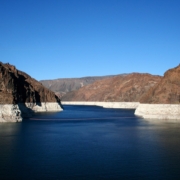The Five Dumbest Things You’ll Hear About Sustainability
by Brian Czech
 This one’s about dumb, dumber, and dumbest, plus two intermediate levels for good measure. Ready for the inglorious countdown?
This one’s about dumb, dumber, and dumbest, plus two intermediate levels for good measure. Ready for the inglorious countdown?
5. “There is no conflict between growing the economy and protecting the environment.”
Might as well say there’s no conflict between plowing a field and protecting the prairie, or logging the woods and protecting the forest, or mining copper and protecting the landscape. No conflict between plastic production and pure water, or paper production and pure air. No conflict between a gazillion cars and the air, water, and climate.
What the heck were the dummies thinkin’?
Maybe it would help if they thought about how the world looked before there was an economy. Or what the American West looked like as Lewis and Clark described it in 1805. Back when GDP was next to nothing. That’s when there was pristine air and water, forests tall and vast, bison in mind-numbing herds, wolves and grizzlies commonplace.
What happened to it all? Why? And does anything describe it better than growing GDP?
It’s hard to believe we’re only at #5!
4. In the information economy, we can dematerialize economic growth.
What did the dummies think all that information would be used for? Invisible inspiration? Immaterial mental massaging? Unmentioned appreciation of unplayed music?
And did they think such immaterial imaginaries would somehow be bought and sold in a free market, contributing to economic growth?
It doesn’t take more than common sense to realize what all that information is used for. If it’s going to contribute to economic growth, it’s going to be used for more competitive farming, logging, mining, paper-making, transportation, and all the other regular old sectors. Oh sure, it can be used for some lighter things too – there’s singing and dancing for example –but if it’s going to be relevant to economic growth, a substantial portion of the information must be used for agricultural and extractive activity.
Maybe common sense is a scarce commodity in the age of video games, derivatives, and e-stuff. Maybe some book-learning is in order, starting with some basic ecology and economics. Here’s a relevant tidbit: Due to the trophic structure of the human economy, economic growth requires increasing agricultural and extractive surplus at the base of the economy. It’s that surplus, and a very material surplus indeed, that frees the hands for the division of labor in the “information economy.”
3. “If the economy’s not growing, it’s dying.”
This one is less illuminating than a 1-watt lightbulb. Might as well say, “If it’s not speeding up, it’s stopping.” Or, “If it’s not getting louder, it’s no longer making noise.”

The tractor protects the prairie, just like economic growth protects the environment. (Image CC BY 2.0, Credit: Sam Beebe)
Or consider the human body. It’s highly relevant because all the human bodies combined constitute the producers and consumers of the macro-economy. Yet those bodies who insist on growing forever; they’re gonna die! And along the way they’ll causes shortages for the rest of us. The only chance of survival is to maintain that body — and the body economic — in a relatively steady state.
It may be true that some familiar institutions can’t co-exist with a steady state economy, such as the fractional reserve banking system. But that’s a problem with the banking system (a big problem), not a problem with the steady state economy, which is the only sustainable alternative in the long run. It’s not exactly rocket science: perpetual growth is unsustainable, perpetual degrowth is unsustainable. That leaves stability, or the steady state economy, as the sustainable alternative.
2. The wealthiest countries have the most environmental protection, which shows we need economic growth to protect the environment.
A common theme with dummies everywhere is linking a grain of truth with the validity of the entire field. For example, Sarah Palin says Russia is near Alaska. That is true. Therefore, says Dummy, she must be an expert in the field of foreign policy.
In this case, the field is neoclassical economics, where economists far removed from the land came up with a crazy construct called the “environmental Kuznets curve.” These economists acknowledge that, as the economy grows, it harms the environment. But then, they say, when enough growth occurs, society has the money to fix the environment!
Next they’ll be telling us the Biggest Loser needs more food to go on a diet.
The fact of the matter is that we have to get serious about going on an economic diet. We don’t need more economic fat to do it; we need only willpower and the common sense to realize that pushing for evermore economic growth is the same as pushing the planet to the brink of disaster. And that includes economic disaster.
Almost to the Dumbest
So we’ve covered dumb and dumber; almost to the dumbest. And there’s been a common theme: a lack of awareness of basic ecology and economics, leaving dummies susceptible to pipe dreams and pro-growth salesmanship. Ready to echo what most pleases Big Money: “There is no conflict between growing the economy and protecting the environment!”
That’s why it may surprise readers to find that the dumbest thing you’ll hear about sustainability comes from an entirely different corner. This is the one spoken by select, educated dummies who may have scientific background to understand the conflict between economic growth and environmental protection, but are oblivious to the sociology of sustainability. They are the quintessential example of the Donald Rumsfeld lament, “We don’t know what we don’t know.”
Drumroll please…
1. “Everybody knows there’s a conflict between economic growth and environmental protection.”
This one is so dumb you may not have even heard it before. It’s a statement uttered by those who think what they know — in this case about the conflict between economic growth and environmental protection — should be self-evident to others. It’s a lazy sort of dumbness based on ignorance of the social facts.
Just because something should be the case doesn’t make it so. Everybody should know there’s a conflict between economic growth and environmental protection, yes. But if you know anything about sustainability, you’re aware of a massive literature describing how neoclassical economics, as played by “win-win” politicians, has led the public astray from common sense. Americans, especially, are all too programmed to believe, “There is no conflict between growing the economy and protecting the environment!” Nationwide public opinion surveys have provided evidence for this win-win rhetoric seeping into the American mind.
So when you hear somebody say, “Everybody knows there’s a conflict between economic growth and environmental protection,” you know something is wrong. It could be sheer ignorance, or it could be something worse. There are highly paid yes-men and women in government, business, the non-profit sector, and even academia who refuse to raise a finger to educate the public on the perils of economic growth. They’re afraid of the personal consequences of telling the truth. But they make up plenty of excuses. They’ll say we don’t need to raise awareness of the conflict between economic growth and environmental protection, because “Everybody knows it.”
So you might object, “When they say such a thing, maybe they’re just being sneaky and cynical, not necessarily dumb per se.”
Ironically enough, only the dummy who says such a thing could actually know.








“Maybe some book-learning is in order, starting with some basic ecology and economics.”
How true that is. For the Latin American members of CASSE, I recommend a book by Professor Hernan Contreras-Manfredi and America G. Cordero Velasquez entitled:
“Ecologia, Conservacion, Desarrollo y Calidad de Vida” published in 1982; revised and republished in 1994 as “Ambiente, Desarrollo Sustentable, y Calidad de Vida”.
Excellent introduction to sustainability. Unfortunately, I believe there is no english translation.
I totally agree. Without a a sustainable plan in place, businesses won’t survive and won’t grow. Sustainability should be at the forefront of every entrepreneur and business owner’s mind.
I stopped reading this about halfway through. I was interested in looking at sustainability until I realized that I had the choice to categorically accept everything you have to say or be labelled an idiot. If you want to convince people who don’t already agree with you, you are going about it all wrong. If you want the people who already agree with you to get a warm sense of superiority over the rest of us, then this is spot-on.
Number 1 and number 5 are the same. So, yes, I did hear of it before.
On another note, economic growth (growth economy) is not something of human design. It’s a state of affairs that we’re born into when we’re born into this world. It’s not something we can control, or stop. The primary factor of a growth economy is population growth. We can try to stop population growth, but more societies grow in population numbers than socieities that control population numbers. It’s only natural for any species to grow until it cannot grow any more – and not by control, but by overpopulation and depletion of natural resources. So any attempt to ridicule advocates of a growth economy is moot. Humans will continue to grow in numbers and thus continue in a growth economy until resources are depleted, and there’s not a damn thing anyone can do about it. The environment is a non-factor – the state of the environment will always be a subject to the species that inhabits it. Like the island of Nauru covered in bird shit, which humans used for phosphates, one day human waste will be useful to a world of insects and maggots. Facts of life – get used to it. Can’t stop progress, can’t stop an avalanche, can’t stop a tsunami, can’t stop global warming, can’t stop humans. Run for the hills.
Let me tell you, it’s a LONG story about choosing to write something this affronting, and a decision not made lightly. I’ll just note that this article got far more readership around the internet than usual. Frankly the frustration with who I’ve called sustainability “dummies” here resonates with many, many people. See for example the comments of Tegan and purplemax at the Huffington Post version of the article:
http://www.huffingtonpost.com/brian-czech/the-five-dumbest-things-y_b_4256549.html
I’m not immune to the disappointment they express. You’re probably completely unaware of the years of scholarship, beginning with my Ph.D. research, I’ve put into this topic before going into the blogosphere. People don’t pay any attention to it, then try to argue deep issues based on a cracker-jack notions.
With this piece, I’m obviously not hoping to win over the “dummies” themselves (who by the way I realize may be quite intelligent about plenty of other matters). All indications are that the article has not only encouraged readers already in the steady state camp, but attracted many others who wondered which way to go. The lesson is, sometimes you have to sacrifice some diplomatic chips to carry a heavy political load. And by the way, that
lightens the burden for others, helping them be more effective.
Dave Says “Facts of life – get used to it. Can’t stop progress, can’t stop an avalanche, can’t stop a tsunami, can’t stop global warming, can’t stop humans. Run for the hills.” I suppose you could compare humanity to a virus, or a bacteria. I think you have a good point Dave. I am not holding out for any solutions or enlightenment, it just isn’t in our DNA.